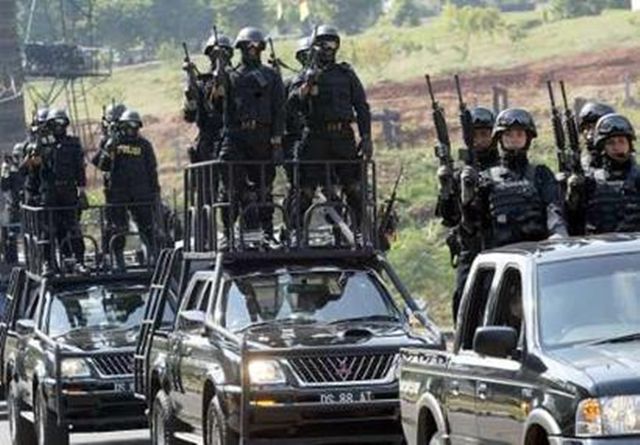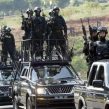
New Directions for Indonesian Militants after Successful Counterterrorist Operations
Publication: Terrorism Monitor Volume: 8 Issue: 41
By:

Since a terrorist training camp was discovered in the northwestern Indonesian province of Aceh last February, Indonesia’s Densus-88 counterterrorism police have arrested over 100 people and killed 13, significantly damaging the efforts of Indonesian militants to regroup and stage a new round of attacks. Significantly, the follow-up operations also led to the arrest of the fiery cleric Abu Bakar Ba’asyir, the head of the Jamaah Ansharut Tauhid (JAT) and the spiritual leader of Jemaah Islamiyah (JI) and its metastasized body, the self-styled “al-Qaeda in Aceh” (Reuters, August 11; Jakarta Globe, August 11).
Jemaah Islamiyah executed suicide bombings in Bali in 2002 and 2005, in Jakarta in 2003, 2004 and 2009, and came extremely close to a 2009 attack in Sumatra. Nonetheless, since 2003, JI has been hit hard by counterterrorist operations, with more than 450 arrests and over 250 convictions. As a result, real schisms have erupted within the organization since 2004. The pro-al-Qaeda “Hambali wing” of JI proposed a policy of attacking the “far enemy,” in particular Western interests and Indonesia’s tourism industry. In 2007, this faction, headed by the Malaysian Noordin Mohammed Top, re-branded itself as “al-Qaeda in the Malay Archipelago” (Reuters, September 19, 2009).
The other wing – what is often referred to as “mainstream JI” – believed attacking Western venues and soft targets was tactically counter-productive and had resulted in mass arrests. This group articulated a strategy based on returning to JI’s pre-Bali modus operandi of engaging in sectarian attacks in Indonesia’s outer islands (especially Sulawesi and the Malukus), creating pure Islamist communities before emanating outward.
By late 2008, a debate had emerged within the ranks of JI over targeting and the types of future operations. There was criticism of Noordin’s obsession with suicide bombings and his narcissistic, Zarqawi-esque video diatribes. Very simply, the annual attacks he could muster had done little to weaken the Indonesian state. If anything, the government had not only weathered JI’s attacks since 2002, but had become stronger because of them. However, there was also significant criticism of “mainstream JI” for achieving so little. By 2007, Indonesian counterterrorism officials had redoubled their conflict prevention efforts in the sectarian conflict zones and neutralized JI’s operations.
In February 2009, Ba’asyir organized the training camp in Aceh with senior JI members, including Dulmatin, one of the bomb-makers in the 2002 Bali bombing who spent years in the southern Philippines before slipping back into Indonesia in early 2009, Abu Tholut, a former JI trainer in Mindanao, Ubeid, a JI operative arrested in 2004 but freed in 2007, and Abdullah Sonata. Between early 2009 and early 2010, the JAT allocated over $28,000 for the training camp (AFP, October 28; Tempo [Jakarta], August 18-24). Other funds came primarily from robberies; the group stole more than $81,000 in four robberies in late 2009-early 2010 alone (Jakarta Post, September 25).
The September 2009 killing of Noordin Top by Densus-88 forces led many of his followers to the new organization, which called itself al-Qaeda in Aceh. This group included members of KOMPAK, a violence-prone Islamist charity, members of the Islamic Defenders Front (FPI) and other JI militants who hoped to regroup (Jakarta Post, October 30; Reuters, April 30).
The new group engaged in military training in order to conduct Mumbai-style attacks with ten-person teams, including an alleged assassination attempt of the Indonesian president (Jakarta Globe, May 15). National Police chief General Bambang Hendarso Danuri explained their new tactics: "They intended to launch urban warfare as in Iraq and Afghanistan and to bring in mujahideen from the two countries." To that end, three police officers were killed in a pre-dawn attack on a police station in North Sumatra province in an attempt to procure more small arms (Jakarta Post, September 25). Another operative, Taufik Marzuki, was arrested in September in Malaysia, where he had been sent to procure weapons, and a former police official who joined the militants was arrested for providing firearms and ammunition to the terrorist group (Jakarta Post, October 30).
An important factor in all of this was that Ba’asyir was not just an organizing force but the group’s amir and spiritual leader. JI had floundered after his 2003 arrest and incarceration until 2006. He was replaced by Abu Rusdan who was quickly arrested. Although he has been freed and remains JI’s amir, Rusdan is reviled by more militant members of the organization. In a telling 75-minute recruitment video found online, the narrator stated, “To all those in JI, I tell you, you don’t fight jihad with the pen or in a prayer cap and sarong. No, you fight jihad with weapons. Before your hair goes gray with age, join us!” The narrator explicitly said Rusdan should not be trusted because all he does now is sit in an office (AP, October 22).
It is a sign of growing confidence that Indonesian authorities arrested Ba’asyir. To date, the government has been timid in arresting anyone not directly linked to a terrorist incident. Unlike in the past when he was convicted only of a broad conspiracy, Indonesian authorities are confident that they have direct evidence linking him to violence. “Our investigators found evidence that Ba’asyir had been actively involved in terror plots and activities including training,” national police spokesman Edward Aritonang said. Ba’asyir “knew all the connections, training and plans that happened in Aceh because he routinely received reports from managers in the field” (Bangkok Post, August 10).
Ba’asyir brushed off his detention, saying, “My imprisonment will not have the slightest impact on the movement. There are a lot of mujahideen who are continuing my struggle without having to depend on me. They still have the spirit alive and are even more militant than me” (Jakarta Post, October 1). Nonetheless, the neutralization of some 115 operatives, at a time when the organization was regrouping and preparing to embark on a new tactical direction, has set the organization back.
However, Indonesian counterterrorism units will still have their work cut out for them. In particular, two of the leaders of the Aceh cell, Ubeid and Abdullah Sonata, who had previously been arrested “successfully completed” the government’s disengagement program (Global Post, July 5). They are not the only recidivists in recent years. Likewise, Densus-88 officials have come under fire for being too aggressive lately and killing too many of their suspects (AP, June 17). Human rights concerns have increased with the September 2010 announcement that the military’s Special Forces unit, Kopassus (much criticized for its abuses) will now have a legal counterterrorism role (Jakarta Globe, October 22; November 4).
The views expressed in this article are those of the author and do not reflect the official policy or position of the National Defense University, the Department of Defense, or the U.S. Government.





